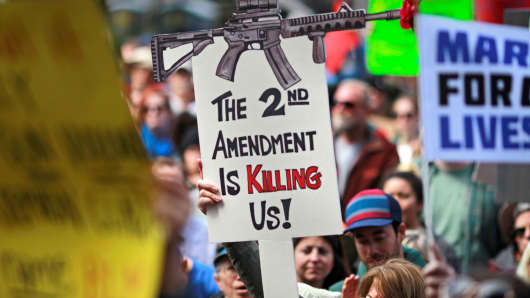The art of civil conversation has largely been lost in America, sowing distrust and a lack of understanding.
This was evident in the 2016 campaign, which featured an inflammatory exchange of insults more than an illuminating exchange of ideas.
It's also obvious in the current debate on gun control.
Years of teaching discussion-based ethics courses involving students who hold strong and opposing points of view on hot topics has taught me that fruitful civil exchange requires humility, fairness, civility, constructive criticism, and appreciation.
All of those are lacking in the current debate about gun violence in America.
Humility is a matter of knowing your strengths and your weaknesses. If you don't recognize your strengths, you won't appreciate what you have to contribute to a conversation. If you don't recognize your limits, you won't appreciate how much you need to learn from the conversation.
No one is learning in the current gun debate.
Parkland teen activist Emma Gonzalez recently said in an interview with CNN, "... I don't really care what people who defend the Second Amendment have to say."
They clearly don't care what she has to say, either, and that is a lost opportunity on both sides.
Fairness is also lacking in the current gun debate. The test of fairness is whether the other side would accept your description of their point of view as accurate and complete. If not, then your characterization of their position is unfair. That is a shame.
The NRA has treated the Parkland teen activists unfairly by simplifying their position to the point of misrepresentation.
ABC News analyst Matthew Dowd, a gun owner, observed Saturday that the NRA tries to make the debate "a false binary choice":
"You are either for the Second Amendment or you are against it, you are either against all gun reforms or you want to take away everyone's guns."
But the reality of the teen activists' position on guns is more complex than the NRA's thinking about it. As Parkland student Jaclyn Corin tweeted on February 25th, "You're missing the point. We don't want to take away your gun rights, we just want to prevent Americans from owning assault weapons and to tighten the methods at which a person can purchase a firearm."
The NRA claiming that those who favor a ban on the sale of assault rifles are anti-Second Amendment is no more reasonable than McDonalds claiming that Weight Watchers is anti-food because they want us to cut down on Big Macs and fries.
It is also no more fair or logical than saying that those who oppose saying "Fire!" in a crowded theatre are against the First Amendment right to free speech.
Fairness in conversation also demands recognizing both the weaknesses and the strengths of our point of view, and the strengths as well as the weaknesses of the opposing point of view. Neither side of the gun debate is doing that.
Fruitful conversation also requires civility. Civility requires the avoidance of rudeness and ideally extends to mutual respect and courteousness.
Civility allows for attacking the opposing position, but not the opponents themselves. That is sorely lacking in the gun debate in particular and civil conversation in general. And it is tearing the fabric of our civil society apart to an alarming degree.
Civil conversation requires a constructive rather than destructive approach to criticism. Those who take a destructive approach focus on determining everything they can that is wrong with the opposing point of view and then criticizing or deriding it.
Those who take a constructive approach focus on determining what is best in the opposing point of view and then working with it to build consensus. Neither side of the gun debate has taken a constructive approach.
Civil conversation requires tolerance of those who hold opposing views but ideally moves beyond mere tolerance to positive appreciation of the other side.
If you truly confident in your beliefs, after all, you should be willing to entertain any argument against them. If you are right, then your point of view will prevail. If you are wrong, then it's better to know that sooner than later.
In either case, there is cause for appreciation. Either you confirm your point of view by testing it against a worthy counterpart, or you change your point of view and better understand the issue.
Samuel Johnson observed, "When once the forms of civility are violated, there remains little hope of return to kindness or decency." Let us endeavor to rediscover the lost art of civil conversation and regain hope.
Commentary by Joseph Holt, a business ethics professor at the University of Notre Dame's Mendoza College of Business. Follow him on Twitter @busethicsdude.
For more insight from CNBC contributors, follow @CNBCopinion on Twitter.


